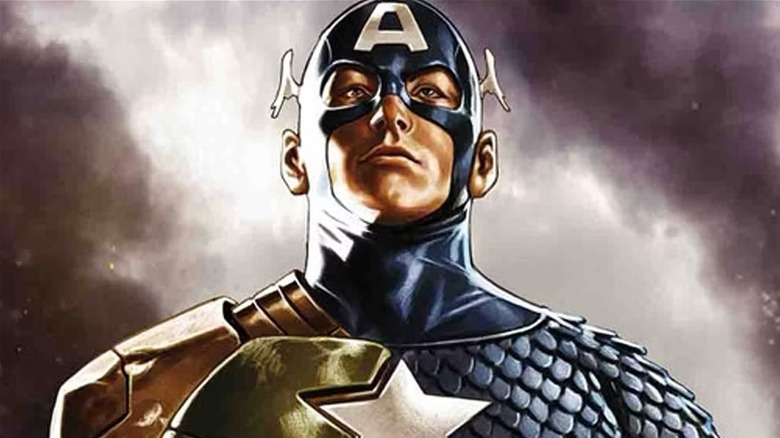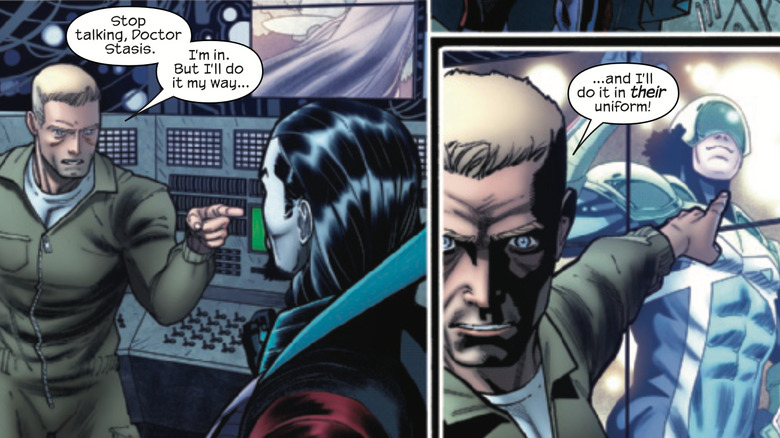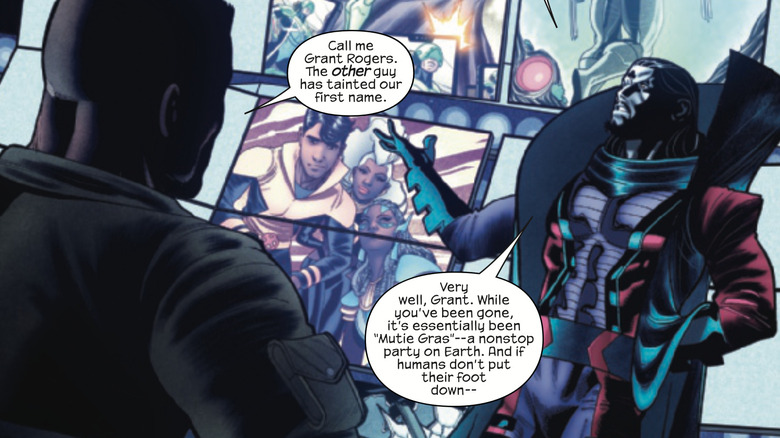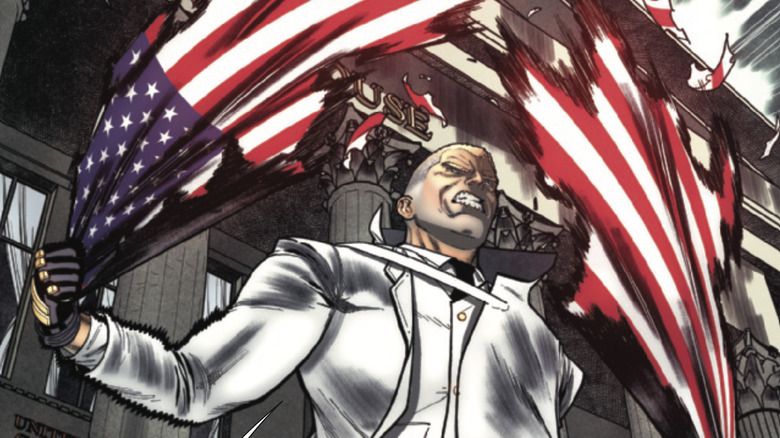Captain America's Evil Clone Just Renamed Himself - Here's Why & What It Means
Contains spoilers for "Uncanny Avengers" #5 (by Gerry Duggan, Javier Garron, VC's Travis Lanham, and Morry Hollowell)
Captain America's evil counterpart is officially back, and with his return, he's taken on a new name: Meet Grant Rogers.
The controversial version of Captain America debuted in 2017's "Secret Empire" (by Nick Spencer, Steve McNiven, Rod Reis, Daniel Acuna, Andrea Sorrentino, and Travis Lanham). In the event, the Red Skull used the Cosmic Cube to change reality and introduce a new version of the patriotic hero who was secretly working for the Nazi villain. Cap seemingly aligning with Hydra made international headlines, with people shocked that Marvel would transform its most patriotic and well-intentioned character into someone supporting everything he usually fights against. Eventually, however, it was revealed that the true Cap never betrayed his ideals, and the comic ended with his evil doppelgänger's defeat and the return of the original Steve Rogers. In recent months, however, the villain, referred to as both Hydra-Cap and Stevil by readers, is back.
In "Uncanny Avengers" #5, the titular superteam takes on the villain after he's revealed to have commandeered the Captain Krakoa identity and become the leader of the Mutant Liberation Front. The issue also fills in several missing pieces, including how he came back in the first place and the new name he has adopted.
Marvel reveals Hydra-Cap's new name and how he returned
"Uncanny Avengers" #5 opens with a conversation between the resurrected Hydra Captain America and Doctor Stasis — the latter working with the anti-mutant organization Orchis to prevent mutants from taking the place of the human race. Immediately upon meeting with the Mister Sinister clone and being referred to as Steve, Rogers says to call him "Grant" as he believes the original name is tainted.
Doctor Stasis begins to explain what has happened in his absence, calling the mutant's existence a "Mutie Gras," aka a nonstop party that leaves humans suffering as a result. Stasis says that without humankind putting their foot down, they could face elimination. Grant's eyes light up at the idea of murdering mutants, and he interrupts Stasis in mid-speech, telling him he wants to do things his way while pointing to a screen featuring Captain Krakoa — a suit originally worn by Cyclops to divert attention away from the going-ons in the mutant paradise of Krakoa. Stevil — sorry, Grant steals the outfit as he reveals he plans to eliminate the X-Men while wearing their uniform.
The Uncanny Avengers eventually take Grant down, but not before he detonates one of the nuclear bombs he had planted across the United States. Despite there being no casualties, as it exploded in a desert, the incident results in Cyclops and the X-Men being framed for Grant's crimes.
Is Grant Rogers a reference to Marvel comics lore?
Hydra-Cap's decision to dub himself Grant Rogers is actually an interesting callback to the somewhat complicated history of the true Captain America's middle name.
When he debuted in 1941, Captain America didn't have a middle name. He was referred to solely as Steve Rogers, which remained the status quo for nearly four decades until "Captain America" #222 (by Steve Gerber, Sal Buscema, John Tartaglione, Mike Esposito, George Roussos, and Annette Kawecki). In that story, Steve learns he had a brother named Mike Rogers who died in the attack on Pearl Harbor. The issue also reveals Steve's middle name is Grant. The revelation didn't last long, as it was retconned in "Captain America" #247 (by Roger Stern, John Byrne, and Josef Rubinstein), where it was learned that his middle name and memories of his brother were the product of the U.S. army, who implanted his mind with false memories to prevent the Nazis from learning the truth about him and his mission should he ever be captured.
The Marvel Cinematic Universe has also used Steve Rogers' middle name. The "What If...?" streaming series episode "What If... Ultron Won?" features Cap being sworn in as President of the United States, where he refers to himself as "Steven Grant Rogers."
Stevil's decision to go by Grant Rogers is a nod to Captain America's history. The fake hero taking on what was proven to be a fake middle name as his own is a fitting way to acknowledge that he's just a cheap imitation of the real hero. However, even if he is a knockoff Avenger, the villain doesn't appear to be going away any time soon.
What does the future hold for Grant Rogers?
Unfortunately, justice hasn't been served when it comes to Grant Rogers, despite the Uncanny Avengers' best attempts to put him away for good.
"Uncanny Avengers" #5 ends with Stevil being freed from jail as Marvel's mutants call his release perverted. His lack of sentencing leads to widespread celebrations and protests outside the courthouse, where the divisive figure gives a horrifying speech. Grant tells the crowd that he will stand with every human being in the face of mutant tyranny. He calls out mutants for preventing peace, having their own laws, and even having their own planet in Arakko. In a surprise move, Grant tells the audience they can't be loyal to any symbol, declaring himself a Flag-Smasher as he rips a United States flag in half and states that humans must band together to protect their world. With the name change and anti-patriotic act, Grant continues to shed his remaining connections to Captain America.
A letter from Doctor Stasis to Orchis also reveals that Cyclops is being put on trial for Captain Krakoa's crimes. He writes that they are ready for the X-Men's attempts to free Cyclops and plan to frame the inevitable effort into something sinister. Stasis adds they need the trial to make headlines to fully showcase the horror of mutant tyranny per Orchis' plan to go after other superteams with mutants on them, including the Avengers and the Fantastic Four. While the newly-christened Grant's latest mission might have been snuffed out, his work alongside Doctor Stasis and Orchis is far from over.
Marvel Comics' "Uncanny Avengers" #5 is now available through comic book shops and online retailers.



